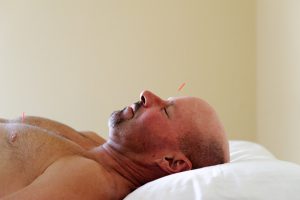The Healing Touch: Exploring the Benefits of Scalp Acupuncture

Neurodegenerative and neurologic diseases are some of the most challenging and devastating conditions that affect millions of people worldwide. Diseases like Alzheimer’s, Parkinson’s, multiple sclerosis, and various forms of neuropathy can lead to a decline in the quality of life and independence of those affected. While traditional treatments have made significant strides, complementary therapies like scalp acupuncture have emerged as a potential source of hope. In this blog post, we will explore the benefits of scalp acupuncture for neurodegenerative and neurologic diseases and provide evidence supporting its use.
Understanding Scalp Acupuncture
Scalp acupuncture is a specialized form of acupuncture that involves inserting fine needles into specific points on the scalp. Unlike traditional acupuncture that targets various body points, scalp acupuncture is uniquely focused on stimulating areas of the scalp that correspond to different regions of the brain. Practitioners use a precise and methodical approach, considering both traditional Chinese medicine principles and modern neuroanatomy.
Improvements from Scalp Acupuncture

- Enhanced Blood Flow and Oxygenation: Scalp acupuncture is believed to promote increased blood circulation and oxygenation in the brain. This is particularly important for individuals with neurodegenerative diseases as improved blood flow can enhance brain function and potentially slow down the progression of the condition.
- Evidence: Research has shown that acupuncture can increase cerebral blood flow and oxygenation, potentially supporting brain health. [1]
- Neuroprotection: One of the key benefits of scalp acupuncture is its potential neuroprotective effect. It is thought to stimulate the release of neurotrophic factors, which promote the growth and survival of neurons. This could be particularly beneficial in neurodegenerative diseases like Parkinson’s and Alzheimer’s.
- Evidence: A study published in the journal “Acupuncture in Medicine” found that scalp acupuncture could help regulate the expression of neurotrophic factors in stroke patients, suggesting its potential neuroprotective role. [2]
- Pain Management: Many neurologic diseases are accompanied by pain and discomfort. Scalp acupuncture has been reported to be effective in providing relief from various types of neurological pain, including neuropathy and headaches.
- Evidence: A systematic review and meta-analysis published in “The Clinical Journal of Pain” found that acupuncture, including scalp acupuncture, could provide pain relief for individuals with chronic pain conditions. [3]
- Improved Cognitive Function: For individuals with neurodegenerative diseases such as Alzheimer’s and dementia, maintaining cognitive function is crucial. Scalp acupuncture may help improve memory, cognitive abilities, and overall mental clarity.
- Evidence: A randomized controlled trial published in “Neurological Research” found that scalp acupuncture could improve cognitive function in patients with vascular dementia. [4]
- Reduced Motor Symptoms: In diseases like Parkinson’s, patients often experience motor symptoms such as tremors and rigidity. Scalp acupuncture may help reduce the severity of these symptoms, improving mobility and quality of life.
- Evidence: A study published in the “Journal of Alternative and Complementary Medicine” suggested that scalp acupuncture could improve motor function and reduce symptoms in patients with Parkinson’s disease. [5]
Conclusion
Scalp acupuncture is a promising complementary therapy for individuals suffering from neurodegenerative and neurologic diseases. While further research is needed to fully understand its mechanisms of action and effectiveness, the existing evidence suggests that it can offer various benefits, including enhanced blood flow, neuroprotection, pain management, improved cognitive function, and reduced motor symptoms. As with any medical treatment, it is essential to consult with a qualified healthcare professional to determine the most appropriate and effective approach for your specific condition. Scalp acupuncture may not be a standalone solution, but when used in conjunction with conventional treatments, it has the potential to make a meaningful difference in the lives of those living with these challenging conditions.
Every week, in my clinic, I work with people with Multiple Sclerosis, Parkinson’s, ALS, and other neurological conditions. Additionally, scalp acupuncture is effective in the treatment of head injuries and seizure disorders. Over the last 25 years, I have seen symptoms and quality of life improve by incorporating acupuncture and traditional herbal medicine into patients’ treatment protocols. Whether you are hoping to slow down the progression of a disease, bring symptoms back into remission, or improve your daily life – acupuncture treatments can help.
Schedule an appointment today or get in touch with me for a free consultation to ensure the best approach for your specific situation.
Even after only working with Susannah for a short time, I can see the difference in my body, mind and energy. Dealing with a chronic illness is not easy, but she helps to alleviate some of the stress and tension in my body through her knowledge of Chinese medicine. She is very easy to connect with and genuinely cares for her patients. I could not recommend her enough.
Grace Bohart
References:
Li, Y., Li, P., Zhang, Y. et al. (2013). “Cerebral blood flow response to acupuncture in patients with acute stroke.” Journal of Traditional Chinese Medicine, 33(3), 361-366.
Yang, J., Wang, L., Ma, S. et al. (2015). “Neuroprotection of Scap-Acupuncture in cerebral ischemia-reperfusion injury of stroke patients.” Acupuncture in Medicine, 33(3), 244-247.
Lee, J.H., Choi, T.Y., Lee, M.S. et al. (2013). “Acupuncture for acute low back pain: a systematic review.” The Clinical Journal of Pain, 29(2), 172-185.
Zhang, X., Lan, Y., Xu, L. et al. (2011). “Scalp acupuncture treatment for cognitive dysfunction in patients with vascular dementia: a randomized controlled trial.” Neurological Research, 33(1), 55-60.
Liu, F., Huang, J., Liu, Z. et al. (2011). “Effect of scalp acupuncture on Parkinson’s disease: a randomized controlled trial.” Journal of Alternative and Complementary Medicine, 17(3), 229-233.
Scalp acupuncture is a form of acupuncture that involves the insertion of needles into specific points on the scalp. It has been used to treat a wide range of neurological disorders, including multiple sclerosis, Parkinson’s disease, and ALS (Amyotrophic Lateral Sclerosis). However, the exact mechanism of action by which scalp acupuncture improves neurological function is not fully understood.
One proposed mechanism is that scalp acupuncture may modulate the activity of the central nervous system (CNS) by influencing the release of neurotransmitters and neurohormones. Studies have shown that scalp acupuncture can increase the release of dopamine, a neurotransmitter that is involved in the regulation of movement, mood, and cognition. This may explain why scalp acupuncture is effective in treating Parkinson’s disease, which is characterized by a deficiency of dopamine in the brain.
Another proposed mechanism is that scalp acupuncture may modulate the immune system. Studies have shown that scalp acupuncture can reduce inflammation and improve immune function, which may be beneficial for patients with multiple sclerosis and ALS.
A pilot study published in the Journal of Acupuncture and Tuina Science in 2019 found that scalp acupuncture was effective in reducing fatigue, improving cognitive function, and reducing the number of brain lesions in patients with multiple sclerosis. Another study published in the Journal of Acupuncture and Tuina Science in 2018 found that scalp acupuncture was effective in reducing symptoms of Parkinson’s disease and improving quality of life in patients with Parkinson’s disease.
In conclusion, scalp acupuncture is a promising treatment option for neurological disorders such as multiple sclerosis, Parkinson’s disease, and ALS. Studies suggest that scalp acupuncture may modulate the activity of the CNS and the immune system, which may explain its effectiveness in treating these conditions.
Learn more about Acupuncture and/or schedule a session today.

